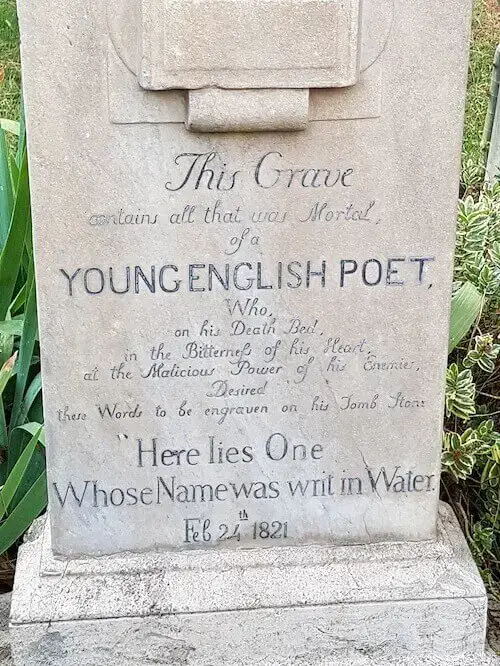Fame, and indeed life, is fleeting.
Here lies one whose name was writ in water
What's the meaning of the phrase 'Here lies one whose name was writ in water'?
What's the origin of the phrase 'Here lies one whose name was writ in water'?
A version of the words originate from Beaumont and Fletcher’s play Philaster, 1611:
“All your better deeds Shall be in water writ, but this in Marble.”
In the better known form ‘writ in water’ they appeared in Keat’s Poetic Works, 1821.
Keats travelled to Rome and died there, aged just 25, in February, 1821. He told his friend Joseph Severn that he didn’t want his name to appear on his tombstone, but merely this line:
“Here lies one whose name was writ in water.”
Severn honoured that wish, as the gravestone shows – Keats is commemorated just as ‘A young English poet’.
Keats’s Grave – New Protestant Cemetery, Rome
This grave contains all that was mortal of a young English poet, who, on his death bed, in the bitterness of his heart, at the malicious power of his enemies desired these words to be engraved on his tomb stone “Here lies one whose name was writ in water.” Feb 24 1821
See also – season of mists and mellow fruitfulness.
Related phrases and meanings
Browse more Phrases
About the Author

Phrases & Meanings
A-Z
A B C D E F G H I J K L M N O P Q R S T UV W XYZ
Categories
American Animals Australian Bible Body Colour Conflict Death Devil Dogs Emotions Euphemism Family Fashion Food French Horses ‘Jack’ Luck Money Military Music Names Nature Nautical Numbers Politics Religion Shakespeare Stupidity Entertainment Weather Women Work
How did we do?
Have you spotted something that needs updated on this page? We review all feedback we receive to ensure that we provide the most accurate and up to date information on phrases.
